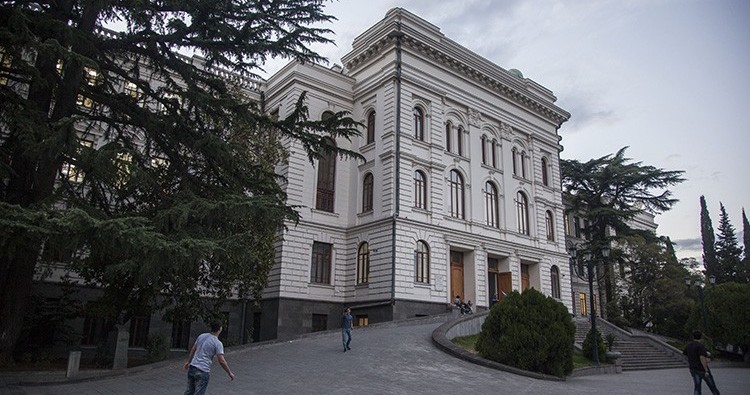Tbilisi State University to complete academic year in hybrid format following student protests

The final and additional exams for the spring semester will still be held in a fully in-person format, with exceptions to be allowed for students from the country’s occupied territories. Photo: Nino Alavidze/Agenda.ge
The ongoing academic year at the Tbilisi State University will be completed with hybrid classes, the educational institution announced on Wednesday, with the decision to host both in-person and remote classes following a weeks-long protest of students against the University’s earlier decision to eliminate online classes starting May 2.
The statement of the institution said the hybrid format of teaching would resume starting May 13, noting the decision on the format of the educational programme was made by the faculties taking into consideration the specifics of the programmes.
The final and additional exams for the spring semester will still be held in a fully in-person format, with exceptions to be allowed for students from the country’s occupied territories.
On Wednesday, the protesting students held a discussion over the issue with TSU Rector Giorgi Sharvashidze, which ended without a result and saw protest organisers announce they would continue their action.
The Democracy Research Institute, a Georgian based non-governmental organisation, also released a statement yesterday in support of the students, saying the basis behind the TSU decision to eliminate online classes was “not clear”. The statement was followed by the Education Ministry calling on the TSU to take into consideration the students’ demands.
Resuming fully in-person studies two months before the end of the current academic year could not have a “significant positive impact” on the quality of teaching, the NGO said. It also pointed out the difficulty for students from Georgian regions to afford accommodation in Tbilisi for attending classes, due to the rising cost of rent caused by increased inflation and an influx of Russian citizens seeking a stay in Georgia since Russia’s invasion of Ukraine that started in February.
The affordability of accommodation has been the central issue in the protest of the students of the University, organisers of which claimed “thousands” of students from the countryside and smaller cities could not attend classes in the capital since the resumption of studies this month due to accommodation costs.
The University originally responded to the demands by saying it did not have necessary funds to ensure continuation of hybrid classes. The argument saw reaction from students who pointed to the institution’s promotion of upcoming entertainment events paid for from its budget, and took other issues with the reasoning.
In their demands, the protesting group also requested the University solve issues with accommodation in its dormitories, with some students telling TSU administration representatives in a meeting on Tuesday the University’s online system had failed to register them for spaces designated in the dorms. The Education Ministry’s statement reflected on the issue and urged the University to ensure the use of the vacant spaces in the dormitories.
In the DRI statement, the NGO also pointed to the “systemic issues” accumulated at the institution, stressing the importance of their solution.
TSU has become a hotspot of student protests several times over the last decade, with demands of reforms from students who challenged issues such as the absence of the internationally adopted peer review system for its teachers, the use of the Student Self-Government body budget for entertainment events on the backdrop of a perceived lack of funds for translation and printing of academic material, and more.
 Tweet
Tweet  Share
Share